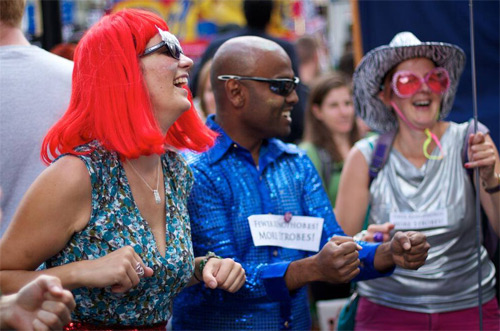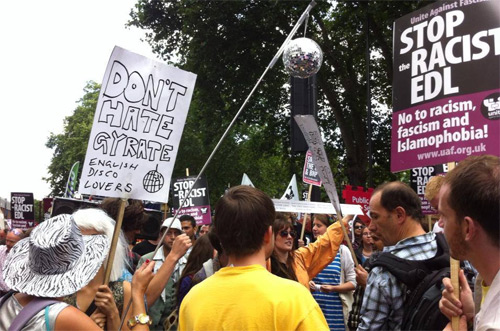Disco is back. Just look at Nile Rodgers’ global re-emergence alongside Daft Punk for sparkly, guitar-licked proof. But whilst Rodgers’ has been helping the Gallic super-robots Get Lucky, there are others twirling the mirrorball to get plucky, as Defected’s Ben Lovett found out.
In the hands of the increasingly weighty English Disco Lovers, disco is a tool for inciting socio-political change – all whilst wearing funky flares and a mile-wide smile.
Perhaps unsurprising the group started out as a joke. Co-founder Alex Jones picks up: “It was August 2012 and I was on a camping trip with some friends. We were drinking, having a laugh and a joke, and this random idea of taking on a nasty, hate-fuelled organisation like the English Defence League with something as fun and footloose as disco just cropped up in conversation.”
Jones’ holiday epiphany sharpened upon his return home. A fine art student, he attended several contemporary exhibitions whose artists had realised fictional political movements in various compelling ways. These collective experiences got him thinking more earnestly about founding a group able to balance credible manifesto with colourful celebration, be it disco or some other similarly-shaded medium.
“My friends and I liked this idea of an antithesis to the EDL but some of the counter-movements already out there were really serious, and some violent” Jones remarks. “We were keen to rally communities to celebrate rather than fight. By encouraging local communities to celebrate themselves, we’d be pushing equality and respect high up the agenda, and effectively dampening down the doctrines of racism and homophobia.”
In the autumn of 2012, Jones and three other London-based friends launched their own EDL Facebook page – English Disco Lovers. The name was shrewdly picked, Jones and co. keen to replace the English Defence League as chief occupier of the EDL acronym – in the digital universe and beyond. A manifesto was officially drawn-up behind the cut-through spearhead of punchy Latin mottos – Unus Mundus, Una Gens, Una Disco (One World, One Race, One Disco) – and brazenly lifted disco lyrics, such as those sung by The O-Jays, The Trammps and The Village People.

“There was some fairly daft appropriation of lyrics” Jones laughs. “But this, remember, is an awareness group which thrives on promotion. Using well-known disco standards is important in terms of pulling in the widest possible support for our ideals. That all said we didn’t expect much reaction to what we were doing. We thought we could make a good start and slowly build up from there, but things moved really quickly.”
Indeed. Come February last year, the English Disco Lover’s Facebook page had generated a whopping 18,000 likes, 3,000 more than the English Defence League’s equivalent, and then the Guardian’s media writer Dorian Lynskey got in touch. “He dropped us an email and we were stunned” Jones recalls. “Once we’d picked ourselves up off the floor, we told him our story and that ended up in the newspaper’s G2 magazine. After that interest in us exploded, we rocketed to 33,000 likes. It was utterly incredible.”
Why did the English Disco Lovers take on the English Defence League, specifically?: “At the time we were forming, the League was more or less on the way out,” he comments. “They were an ideal target because we felt we could help put the last nail in their coffin and really cement our standing.”
And that they did, not just overtaking the English Defence League in terms of Facebook prominence but also, last summer, achieving the number one spot on Google for searches on ‘EDL’ (up popped their brand new website), although the top spot has since returned to the English Defence League – for the time being at least. For the first time, Google was returning an anti-racism, anti-homophobia group ahead of the direct opposite. It had been the English Disco Lovers’ number one objective upon forming.
Of course, by now, the Lovers had grown well beyond their digital roots. The group were organising club nights up and down the country and organising boogie-fuelled counter-demos wherever the Defence League was due to provoke and protest. Counter-demos saw supporters preaching the ‘don’t hate, gyrate!’ slogan to curious onlookers whilst dancing to sweeping mainstream disco (Gloria Gaynor’s I Will Survive a good starting point) in full-on afro wigs and sequinned flares. Word was spreading, but was there ever a danger of the general public viewing such activity as mere novelty? Is there still a danger of that happening?
“There will always be critics of the anti-fascism movement; in our case, we’ve already had the opposition trying to discredit us as a bad joke” Jones explains. “But there are too many groups hyping violence and aggressive protest against the likes of the English Defence League and British National Party, and we don’t feel that’s the right way to approach the situation. It may be the popular option but we’re here for positivity not fighting, therefore we work in the way that we do.

“To be honest, hate crimes, racism and Islamophobia are all difficult topics to talk about, so here is a way to raise the issue effectively. And as I’ve already mentioned, this is a popularity contest. We need to be able to shout clearly and loudly where so many are already speaking their mind. The big disco sounds give us a great hook and entry point into the debate.”
That’s not to say the socio-political origins of disco are in any way lost on Jones and his team. Jones, with a keen academic interest in socio-political history, talks confidently about disco’s Stonewall legacy, Studio 54’s poly-sexual excesses (a colourful representation of the scene’s unfettered devotion to tolerance, equality and communal harmony) and the bitter ‘disco sucks’ backlash against those black, Latino and gay minorities driving the sound forward throughout the Seventies. Disco’s historical context of social struggle, perseverance and, ultimately, triumph is a perfect fit for Jones’ 21st century crusade.
And if, sonically-speaking, Jones was unmoved by the disco groove back at the start, then he has subsequently seen the (neon, flashing) light. “I wasn’t a huge disco fan in the beginning” he confirms. “I appreciated its relevance to our cause...its political significance but that was it really. Today, of course, I’m totally converted. I get how it makes people feel; people totally lose themselves in it.”
That was much the reality late last month, when the English Disco Lovers took over east London’s Dalston Superstore for a fundraiser with local HIV charity Positive East. Revellers, and supporters, packed out to the superlative underground sounds of taste-makers Yam Who?, Ben Pistor (Disco Bloodbath) and Deadly Sins - so much for criticism that the Lovers are only about cheesy disco tokenism. “We’ve had so much support in terms of the club nights” Jones urges. “Yam Who? are major supporters, helping us book the right DJs for example. At the same time the co-founders and I are always sharing ideas and new contacts to ensure our events are good as they can be, whether they’re in London, Manchester, Bristol, Exeter, Brighton, the north east.... This is still a political movement but the music has never been so important to us.”
What does the future hold? “In the short-term, I think it’s simply keep spreading the word” he says. “The universal message is ‘don’t hate, gyrate!’ and we’re looking at an ever wider range of events to support that. Moving forwards, I think there will be more events than demos; they’re more effective and closer to our ideal of peaceful protest...less confrontational. We have a summer of appearances at festivals, too, like Kendal Calling, Shambala and BoomTown; we’re also moving into talks and workshops. There’s a lot planned. We’re talking a lot right now about how far we can take this thing, particularly beyond our studies.”
And longer-term?: “That’s a hard one to answer. Music unites so many people all over the world. It’d be great if more contemporary music took up good causes because the right messages would cover a greater distance more quickly. But, as always, it takes more people to make that happen. There are some great organisations out there like Drop Beats Not Bombs but not enough; it’s still one step at a time.”
Jones should feel reassured that the steps the English Disco Lovers have taken during their short time together have taken them far. It’s a hugely impressive achievement. From topping Google searches and dropping Google bombs (one memorable ‘bomb’ last August forced the English Defence League’s site down for over a week) to hosting impactful parties and demos all over the UK, there is little that Jones and his friends haven’t successfully turned their attention to. It bodes well for the coming months.
“Perhaps my biggest highlight of the past two-and-a-half years isn’t actually the group’s biggest moment” Jones muses. “But I always think of the counter-demo we organised last April in Brighton. It was the March For England, which involved a number of right-wing fascist groups and counter-demonstrators. The anti-fascists were all shouting things like ‘Nazi scum!’ and then suddenly our float rolls past blaring out I Will Survive and with all of us in costumes. Quite a few of marchers were confused; they didn’t know what to do. The shouting stopped and some people started to sing; there was even the odd hip-wiggle. That for me is what it’s all about – turning negatives into funky positives. It was a priceless moment.”
Words: Ben Lovett
Bargrooves Disco is out March 23 – order from iTunes
For more details on the English Disco Lovers, and forthcoming events visit www.edl.me
Headline image taken from the following article about the 2013 Nottingham demonstration: http://nottingham.tab.co.uk/2013/05/25/my-day-without-the-edl/



